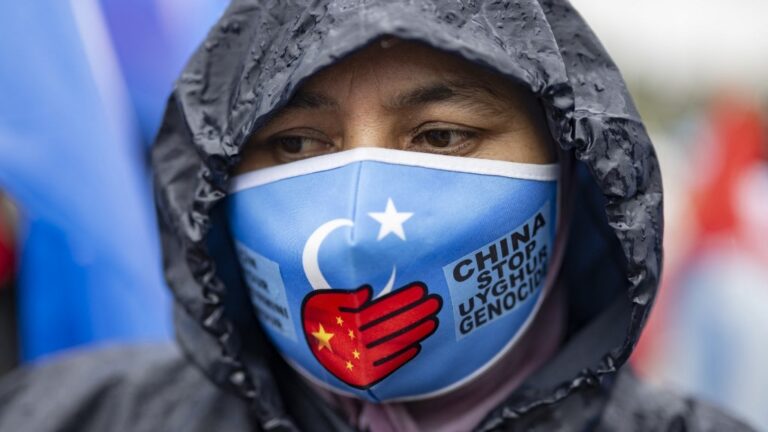During a visit to China earlier this week, Turkish Foreign Minister Hakan Fidan quietly called for protecting the rights and culture of the Uighur minority, two Turkish officials told Middle East Eye.
In Beijing, Foreign Minister Fidan met with Chinese Foreign Minister Wang Yi and Vice President Hang Zheng.
Fidan also visited Xinjiang, his highest-level visit to the region since 2012. Wearing a turquoise tie – the colour of the Uighur flag – Fidan met with officials and Uighurs in Urumqi and Kashgar, calling the cities “ancient Turko-Islamic cities” that connect China with the Turkic and Islamic worlds.
But Fidan drew criticism online from some Uighur groups for failing to criticize China’s documented mistreatment of the Uighur minority, including the detention of thousands of people in what it calls “re-education camps.”
A 2022 UN human rights report accused China of committing crimes against humanity in its treatment of the Uighurs.
Stay up to date with MEE’s newsletter
Sign up to get the latest alerts, insights, and analysis.
Starting with Unpacking Türkiye
Two Turkish diplomatic sources said Ankara had stressed the importance of the Uighur issue to Beijing.[We told them that] “The Uighur Turks are very important to us because of our ethnic, religious and cultural ties,” one diplomatic source said. “You know, we conveyed to them the sensitivity of the Turkish world and the Islamic world when it comes to protecting the cultural rights of the Uighur Turks and practicing their values.”
The source added that while the Turkish government respects China’s sovereignty and supports the “one China” policy, it believes it is essential to address concerns about the rights of the Uighurs.
“We told them it would be in everyone’s greater interest to completely eliminate any concerns the Turkish and Muslim world has about the Uighurs,” the source said. “Changing perceptions on this issue will only be possible through steps taken by China.”
Chinese authorities “shaken”
Fidan’s visit to Xinjiang has also been criticized as being orchestrated by Chinese authorities. A second Turkish official said Turkey had accepted Beijing’s offer to monitor the situation in the Uighur region to “clearly convey our views to the authorities on the ground.”
At a joint press conference with Chinese Foreign Minister Wang Yi, Fidan reiterated that Turkey opposes any terrorist activities in China, supports China’s territorial integrity and respects China’s expanding influence in the region. But his comments calling Urumqi and Kashgar Turkish and Islamic cities may have unsettled Chinese authorities.
“From what I’ve heard from people I know, the statement may have riled up some Chinese officials,” said Diren Dogan, a visiting researcher at the University of Oxford. “Calling these cities Turkish and Islamic cities is in complete contradiction to the official Chinese line, but Fidan’s anti-terrorism stance and support for the One China policy probably offset any negative reaction.”
Dogan said Turkey is caught in a dilemma: it wants to maintain diplomatic and trade ties with China while also upholding the rights and freedoms of the Uighurs.
A second Turkish government official said relations between the two countries have been at a standstill since a consortium of Chinese companies abandoned a project to buy a stake in Istanbul’s third bridge for about $700 million in 2021 and former Finance Minister Berat Bayrak, a strong supporter of pro-China policies, resigned in 2020.
A source in Ankara said the delay in a delivery of COVID-19 vaccines from China in March 2021 marked a new low in relations, and Beijing has reportedly demanded the extradition of several Uighur dissidents from Turkey to China as a gesture. “Turkey has rejected these demands,” another source said.
Revival of Türkiye-China relations
Foreign officials say Fidan has been exploring ways to repair Turkey’s ties with China in recent months, as Ankara cannot ignore China’s growing diplomatic and military power.
“This was an attempt to get China to restore relations of mutual respect and benefit,” the second Turkish official said. “We are asking China to lift restrictions on Turkish agricultural exports and allow more Chinese tourists to Turkey, helping to offset a trade deficit of more than $40 billion for China and increasing Chinese investment.”

Türkiye and China close to nuclear power plant construction agreement
read more ”
Ankara also wants China to build a nuclear power plant in western Turkey, but Beijing has so far avoided making a final commitment despite holding comprehensive talks with Turkish officials about the project.
“Without a strong political relationship between the two governments, it will be impossible to secure Chinese investment in nuclear projects,” one consultant, who asked not to be named, told MEE.
Earlier this month, Turkish Energy Minister Alparslan Bayraktar signed a memorandum of understanding with his Chinese counterpart on rare earth minerals and nuclear energy during an official visit to Beijing.
Dogan added that any agreement on the nuclear plant must be signed between Turkish President Recep Tayyip Erdogan and his Chinese counterpart Xi Jinping.
Fidan has invited Xi to make a state visit to Turkey later this year, but it is unclear whether he will accept.
During his visit to China, Fidan stressed the importance of the so-called “middle corridor” to both China and Turkey and called for an increase in commercial flights between the two countries, including to Urumqi, a second Turkish official said.
Chinese Foreign Minister Wang Yi said at a joint press conference that China is willing to cooperate with Turkey on the Central Corridor and expand imports of high-quality agricultural products from Turkey.
“The US-backed India-Middle East-Europe Economic Corridor (IMEC) bypasses Turkey and China and encourages the two countries to cooperate through the Central Corridor and the Iraq Development Road, which may connect to the Central Corridor,” Dogan said. “I think the visit was successful in terms of creating a path between Turkey and China,” Dogan added.

